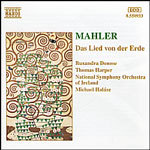
Das Lied von der Erde (Song of the Earth)
 $25.00
Out of Stock
$25.00
Out of Stock6+ weeks add to cart
MAHLER
Das Lied von der Erde (Song of the Earth)
Ruxandra Donose (mezzo-soprano) Thomas Harper (tenor) / Ireland National Symphony Orchestra / Michael Halasz, conductor
[ Naxos / CD ]
Release Date: Tuesday 16 November 2004
This item is currently out of stock. It may take 6 or more weeks to obtain from when you place your order as this is a specialist product.
"All in all this is an amazing bargain"
- Gramophone
"Naxos have done it again. Let me begin with the recording. It has clarity, bloom, depth and truthfulness not often found even at the top of the price range, and is particularly notable for placing the singers in a prominent position, yet in exactly the right relationship with the orchestra. Above all it has presence. One cannot ask for more. The musical performance seems to me just right.... It is plain, unadorned, presenting the score, if that is possible, as it is, with little in the way of deliberate interpretation.... All in all this is an amazing bargain"
- Gramophone
The National Symphony Orchestra of Ireland is first rate; the winds are especially lovely... Excellent well-balanced recording with great presence.
- Fanfare April - 1996
The great Viennese symphonic tradition found worthy successors in two composers of very different temperament and background, Anton Bruckner and Gustav Mahler. The latter, indeed, extended the form in an extraordinary way that has had a far-reaching effect on the course of Western music, among other things creating a symphonic form that included in it the tradition of German song in a varied tapestry of sound particularly apt for a twentieth century that has found in Mahler's work a reflection of its own joys and sorrows.
Mahler was to express succinctly enough his position in the world. He saw himself as three times homeless, a native of Bohemia in Austria, an Austrian among Germans and a Jew throughout the whole world. The second child, and the first of fourteen to survive, he was born in Kaliste in Bohemia in 1860. Soon after his birth his family moved to Jihlava, where his father, by his own very considerable efforts, had raised himself from being little more than a pedlar, with a desire for intellectual self-improvement, to the running of a tavern and distillery. Mahler's musical abilities were developed first in Jihlava, before a brief period of schooling in Prague, which ended unhappily, and a later course of study at the Conservatory in Vienna, where he turned from the piano to composition and, as a necessary corollary, to conducting.
It was as a conductor that Mahler made his career, at first at a series of provincial opera-houses, then in Prague, Budapest and Hamburg, before moving to a position of the highest distinction of all, when, in 1897, he became Kapellmeister of the Vienna Court Opera, two months after his baptism as a Catholic, a necessary preliminary. In Vienna he effected significant reforms in the Court Opera, but made enough enemies, particularly represented in the anti-semitic press, to lead to his resignation in 1907, followed by a final period conducting in America and elsewhere, in a vain attempt to secure his family's future before his own imminent death, which took place a week after his final return to Vienna, on 18th May, 1911.